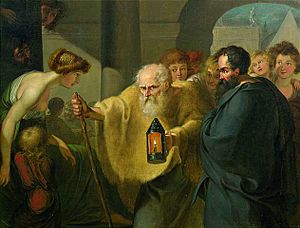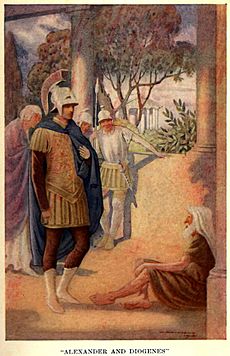Diogenes facts for kids
Quick facts for kids
Diogenes of Sinope
|
|
|---|---|
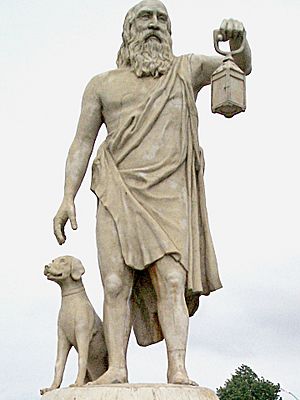
Statue of Diogenes at his birthplace in Sinop, Turkey
|
|
| Born | late 5th century BCE Sinope, Paphlagonia
(modern-day Sinop, Turkey) |
| Died | 323 BC |
| Era | Ancient Greek philosophy |
| Region | Western philosophy |
| School | Cynicism |
|
Notable ideas
|
Cosmopolitanism |
|
Influences
|
|
|
Influenced
|
|
Diogenes (/daɪˈɒdʒɪniːz/ DY-oj-IN-eez), also known as Diogenes the Cynic or Diogenes of Sinope, was an ancient Greek philosopher. He was one of the main thinkers who started Cynicism. He was born in Sinope, a Greek city on the Black Sea coast, around 412 or 404 BC. He passed away in Corinth in 323 BC.
Diogenes was a very unusual person. He had to leave Sinope because of a problem with changing the city's money. His father was a banker, and it's not fully clear if Diogenes or his father, or both, were involved. After leaving Sinope, he went to Athens. There, he openly criticized many of the common ways people lived. Later, Diogenes was captured by pirates and sold as a slave. He ended up living in Corinth. In Corinth, he shared his ideas of Cynicism with Crates. Crates then taught Zeno of Citium, who used these ideas to create Stoicism. Stoicism became one of the most important schools of Greek philosophy.
Diogenes didn't write any books himself. We know about him from stories and sayings that others wrote down. Many of these stories come from a book by Diogenes Laërtius called Lives and Opinions of Eminent Philosophers. Diogenes believed that living a simple life was a good thing. He often begged for food and sometimes slept in a large ceramic jar, called a pithos, in the marketplace. He used his simple lifestyle and actions to show what he thought was wrong with society. He was known for eating and sleeping wherever he wanted, which was very unusual. He also tried to make himself tough against nature. He famously said he was a "citizen of the world" instead of belonging to just one city.
He looked up to Heracles, a Greek hero, believing that being good was shown more by actions than by words. He became famous for his philosophical stunts. One famous story is that he carried a lamp during the day, saying he was "looking for a man." This meant he was looking for someone truly honest and wise. He also criticized Plato and even interrupted Plato's lectures. Diogenes was also known for mocking Alexander the Great. This happened when Alexander visited Corinth in 336 BC.
Contents
Life of Diogenes
We don't know much about Diogenes's early life. We know his father, Hicesias, was a banker. It seems Diogenes might have worked in the banking business with his father.
At some point, Diogenes and his father got into trouble. They were involved in a scandal about changing the city's money. Because of this, Diogenes was sent away from Sinope. He lost his citizenship and everything he owned. This story seems to be true because old coins from Sinope have been found that were deliberately damaged. These coins date back to the time Diogenes lived there. Some coins even have Hicesias's name on them as the official who made them.
In Athens
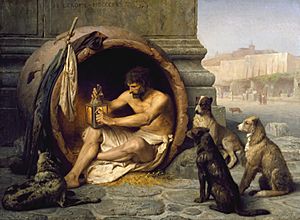
One story says that Diogenes went to the Oracle at Delphi for advice. The Oracle told him to "deface the currency." After the trouble in Sinope, Diogenes decided this meant he should challenge people's ideas and customs, not just money. So, he traveled to Athens. His goal was to question the usual ways of thinking and living. He believed people worried too much about what was considered "normal" instead of what was truly good or bad.
When Diogenes arrived in Athens, he had a slave named Manes. Manes soon ran away. Diogenes joked about it, saying, "If Manes can live without Diogenes, why can't Diogenes live without Manes?" He didn't like the idea of people being too dependent on others. He was interested in the simple way of life taught by Antisthenes, who was a student of Socrates. Diogenes wanted Antisthenes to teach him. Antisthenes was very tough and even tried to hit him with a stick. But Diogenes said, "Hit me, you won't find a stick hard enough to keep me away, as long as I think you have something to teach!" Diogenes became Antisthenes's student. He lived an even simpler life than his teacher. He wanted to show how silly and fake he thought Athenian society was.
Stories about Diogenes show how consistent he was in his beliefs. He made himself tough by living in a large clay wine jar near a temple. He threw away his only wooden bowl when he saw a boy drinking water with his hands. He said, "I've been carrying useless things all this time!" It was against Athenian rules to eat in the marketplace. But Diogenes would eat there, explaining that he was hungry when he was there.
He often walked around in daylight carrying a lamp. When people asked what he was doing, he would answer, "I am looking for a man." He meant he was looking for someone truly wise and honest. In his view, the way people acted meant they didn't really count as "men." Diogenes taught by living his philosophy. He wanted to show that true wisdom and happiness come from being independent of society. He thought that civilization actually made things worse. He didn't care about family, social rules, property, or fame. He even ignored normal ideas about polite behavior.
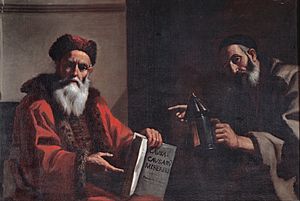
Diogenes didn't like Plato and his complicated ideas. Diogenes saw Antisthenes as the true follower of Socrates. He shared their love for being good and not caring about wealth. Diogenes believed he could help people's souls and make them better, even though he thought they were often foolish. Plato once called Diogenes "a Socrates gone mad."
According to a story, Plato once defined a human as a "featherless biped" (meaning a two-legged creature without feathers). Diogenes then plucked a chicken and brought it into Plato's school, saying, "Look! I've brought you a man!"
In Corinth
A story says that Diogenes was captured by pirates while traveling. He was sold as a slave in Crete to a man from Corinth named Xeniades. When asked what he could do, Diogenes said he knew no job except "governing men." He said he wanted to be sold to someone who needed a master. Xeniades liked his spirit and hired Diogenes to teach his children. Diogenes is said to have lived in Corinth for the rest of his life. He spent his time teaching about living a good life with self-control. There are different stories about what happened to him after teaching Xeniades's sons. Some say he was set free, others that he stayed with Xeniades's family until he died. He even gave talks to large crowds at the Isthmian Games.
It was in Corinth that Alexander the Great is said to have met Diogenes. These stories might not be entirely true. Accounts say they exchanged only a few words. Diogenes was relaxing in the sun. Alexander, excited to meet the famous philosopher, asked if there was anything he could do for him. Diogenes famously replied, "Yes, stand out of my sunlight." Alexander then said, "If I were not Alexander, then I should wish to be Diogenes." Diogenes replied, "If I were not Diogenes, I would still wish to be Diogenes." In another version of their talk, Alexander found Diogenes looking closely at a pile of human bones. Diogenes explained, "I am looking for the bones of your father, but I can't tell them apart from a slave's bones."
Death of Diogenes
There are different stories about how Diogenes died. Some people said he held his breath until he passed away. Other stories say he got sick from eating raw octopus or had an infected dog bite. When asked how he wanted to be buried, he said to throw his body outside the city wall so wild animals could eat it. When asked if he minded this, he joked, "Not at all, as long as you give me a stick to chase the creatures away!" When asked how he could use a stick if he was dead, he replied, "If I'm dead, why should I care what happens to me?" Until the very end, Diogenes made fun of people's worries about how the dead should be treated. The people of Corinth built a monument to him, with a dog statue made of marble on top.
Diogenes's Philosophy
Diogenes is seen as one of the founders of Cynicism, along with Antisthenes and Crates of Thebes. We learn about Diogenes's ideas mostly from stories about his life and sayings. This is because he didn't leave any writings of his own, even though he was said to have written many books. Cynic ideas are closely linked to how Cynics lived their lives.
Many stories about Diogenes talk about his dog-like behavior. He also praised the good qualities of dogs. It's not clear if people first called him "doggish" as an insult and he then embraced it, or if he started using the dog theme himself. When asked why he was called a dog, he said, "I wag my tail for those who give me anything, I bark at those who refuse, and I bite rascals." The word "cynic" comes from the Greek word kynikos, which means "dog-like," and that comes from kyôn, meaning "dog." One old explanation for why Cynics were called "dogs" was that Antisthenes taught in a place in Athens called Cynosarges, which means "the place of the white dog." Later Cynics also used the name to their advantage.
Diogenes believed that humans live in an artificial and fake way. He thought people would do well to learn from dogs. Dogs can do natural things in public easily. They will eat anything and don't fuss about where to sleep. Dogs live in the moment without worrying. They don't care about complicated ideas. Besides these good qualities, dogs seem to know by instinct who is a friend and who is an enemy. Unlike humans, who often trick others or are tricked, dogs will give an honest bark at the truth. Diogenes said that "other dogs bite their enemies, I bite my friends to save them."
Diogenes believed that all the artificial things in society stopped people from being happy. He thought that being good meant going back to the simple ways of nature. His simple and tough lifestyle was so great that the Stoics later called him a wise man. He said, "Humans have complicated every simple gift of the gods." Although Socrates had said he belonged to the world, not just one city, Diogenes is known for being the first to use the word "cosmopolitan." When asked where he came from, he replied, "I am a citizen of the world." This was a very new idea at a time when a person's identity was strongly tied to their city. Diogenes, an exile with no clear social identity, made a big impact on the people of his time.
Legacy of Diogenes
Diogenes in Art
Many artists, both long ago and more recently, have been inspired by Diogenes. You can find old statues of him in museums like the Vatican, the Louvre, and the Capitol. A famous ancient carving shows the meeting between Diogenes and Alexander. In Raphael's famous painting The School of Athens, a figure lying down in the front represents Diogenes.
In Shakespeare's play Timon of Athens, there are many references to dogs. These refer to the Cynic philosophy. Some people think this suggests a link between the hermit Timon, who disliked people, and Diogenes. However, Shakespeare probably knew that Timon and Diogenes were different. Timon actively wished bad things on people and avoided them because he saw them as dangerous. Diogenes, on the other hand, thought so little of people that contact with them didn't bother him. "Timonism" is often compared to "Cynicism." Cynics were upset by what people had become, while Timonists believed humans were naturally stupid and uncaring, so there was no hope for change.
The philosopher's name was used for the fictional Diogenes Club. This club is mentioned in the Sherlock Holmes story "The Greek Interpreter" by Sir Arthur Conan Doyle. Sherlock Holmes's brother, Mycroft Holmes, belongs to it. The club is named after Diogenes because its members are educated but quiet and don't like socializing, much like the philosopher himself.
Diogenes in Psychology
Diogenes's name has also been used for a behavioural disorder called "Diogenes syndrome." This disorder involves people who seem to neglect themselves and hoard things. It mostly affects older people. However, this name is not very fitting for Diogenes himself. Diogenes chose to live without comforts and was definitely not a hoarder. The name is often criticized because Diogenes believed he was helping himself by living simply.
See also
In Spanish: Diógenes de Sinope para niños
 | James Van Der Zee |
 | Alma Thomas |
 | Ellis Wilson |
 | Margaret Taylor-Burroughs |


